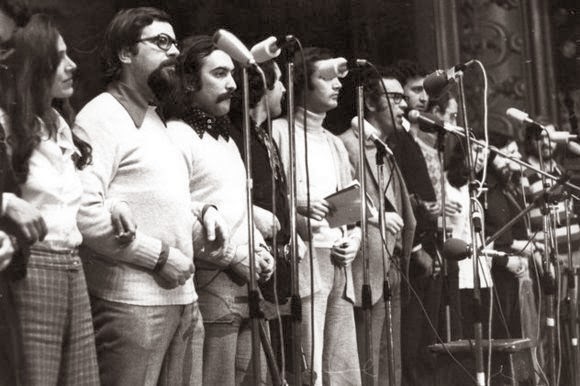“Grândola, Vila Morena”, José Afonso
José Afonso’s music is already so digested by our collective memory that, when we listen to an album of his, we listen to what we have in our memory and not what is recorded. There are few songs where this is as obvious as in “Grândola, Vila Morena”. Almost everyone thinks they can sing it, but few know the lyrics from start to finish, and even fewer listen to this chilling, circular song with musical direction by José Mário Branco.
“Trova do Vento Que Passa” (Thunder of the Passing Wind), Adriano Correia de Oliveira
Magnificent ballad composed by António Portugal, based on a poem by Manuel Alegre. Over the years, this discreet critique of the Salazar dictatorship, at the same time regretful and full of hope, was recorded by many people, from Quarteto 1111 to Amália Rodrigues. But the definitive version will always be this one, sung by Adriano Correia de Oliveira in 1963.
“Queixa das Almas Jovens Censuradas” (Complaint of Censored Young Souls), José Mário Branco
José Mário Branco created a great song about this poem by Natália Correia to which he lent his voice and genius. A denunciation, as lucid as it is disillusioned, of the conformism and mediocrity promoted by the dictatorship and one of the highlights of his 1971 debut album, the masterful Mudam-se Os Tempos, Mudam-se as Vontades.
“O Povo Unido Jamais Será Vencido” (The united people will never be defeated), Luís Cília
Written by Sergio Ortega Alvarado and the Quilapayún before the fascist (US-sponsored) coup d’état that deposed Salvador Allende in 1973, “El Pueblo Unido Jamás Will Be Vencido” became one of the anthems of the Chilean resistance and the international left. In 1974 the Chilean band, exiled in France at the time, accompanied Luís Cília, who had also lived in France during the Salazar dictatorship, in this Portuguese version of the song.
“O Patrão e Nós” (The Boss and Us), Fausto
Fausto Bordalo Dias’ second album, P’ró Que Der e Vier, is wonderful. A combative and politically committed record, recorded in 1974 and without fear of calling the bulls by their names. Few songs are as direct as “O Patrão e Nós”, with hard and honest verses such as: “It has a bank and many factories/ It has the name of a boss/ But hold on to the fact that it’s a thief/ It’s not necessary and it’s a bastard”.
“Somos Livres” (We Are Free), Ermelinda Duarte
In the hangover of the 25th of April, José Cid made the arrangements and the actress Ermelinda Duarte interpreted this song in the play Lisboa 72-74 by Teatro Estúdio de Lisboa. After listening to it, Mário Martins, from Valentim de Carvalho, invited her to edit it on disc, and José Cid produced the single. The song ended up becoming one of the most iconic of the years following the revolution.
Source: timeout.pt






A nice walk through this great songs